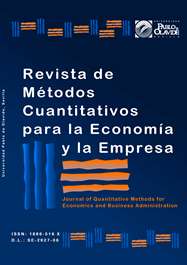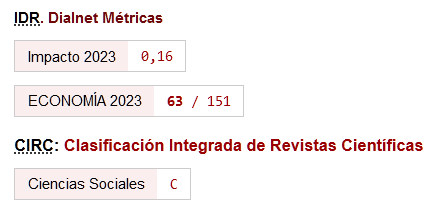Determinants of the growth aspiration of Colombian entrepreneurs: the Role of Some Generations, Baby Boomers, Generation X and Millennials
DOI:
https://doi.org/10.46661/revmetodoscuanteconempresa.6893Keywords:
entrepreneurial activity, entrepreneurship, growth aspirations, generations, ColombiaAbstract
This paper aims to estimate the probability of growth aspirations of Colombian entrepreneurs according to the generation in which they were born. There is a large literature on the determinants of the growth aspiration, but there is not much empirical evidence on the possible effects of belonging to a specific generation. We used data from the Global Entrepreneurship Monitor for the period between 2006 and 2017. Specifically, the data were taken from the Adult Population Survey, which measures certain relevant characteristics of entrepreneurs around the world. Based on a sample of 6,670 individuals, three ordinal logistic regression models were estimated, one for each generation: Baby Boomers, Generation X and Generation Y-Millennials. The results show that the youngest entrepreneurs, the Millennials, have a very different conception of life than their predecessors in relation to their view of entrepreneurship as a life choice. In fact, structural factors such as gender, education and motive for entrepreneurship are significant for all generations. However, context-related factors such as their skills, fear of failure, recognition, and their view of entrepreneurship as a desirable career have different effects on each generation. These results are relevant for the development of public policies and business strategies associated with entrepreneurship in developing regions.
Downloads
References
Aiken, L.S., West, S.G., & Reno, R.R. (1991). Multiple regression: Testing and interpreting interactions. US: Sage.
Ardagna, S., & Lusardi, A. (2008). Explaining international differences in entrepreneurship: The role of individual characteristics and regulatory constraints (No. w14012). National Bureau of Economic Research. https://doi.org/10.3386/w14012
Arenius, P., & Minniti, M. (2005). Perceptual variables and nascent entrepreneurship. Small Business Economics, 24(3), 233-247. https://doi.org/10.1007/s11187-005-1984-x
Autio, E., & Ács, Z.J. (2009). Institutional influences on strategic entrepreneurial behaviours (No. 2009, 080). Jena Economic Research Papers.
Buitrago, J. (2014). Emprendimiento en Colombia. Administración & Desarrollo, 43(59), 7-21. https://doi.org/10.22431/25005227.101
Chávez, B., & Barrera, G. (2017). Emprendimiento en las 4 generaciones: Baby Boomers, X, Millenialls, Z. http://www.inacap.cl/web/2019/flippage/reportes-gem/generacion/aysen-generacion/files/AYSEN-ID-GENERACION-07052019-PAGINAS.pdf
Cuevas, J.R.T., Martínez, C.L.Z., & Cuevas, L.M.T. (2022). Factores asociados al emprendimiento de migrantes colombianos retornados: una aproximación Bayesiana. Revista de Métodos Cuantitativos para la Economía y la Empresa, 33, 408-438.
Delmar, F., & Wiklund, J. (2008). The effect of small business managers' growth motivation on firm growth: A longitudinal study. Entrepreneurship Theory and Practice, 32(3), 437-457. https://doi.org/10.1111/j.1540-6520.2008.00235.x
Díaz, N., Fajardo E. & Romero, H. (2021). Cultura y emprendimiento en Colombia: un estudio correlacional para el 2017. Cuadernos Latinoamericanos de Administración, 17(33), 44-52. https://doi.org/10.18270/cuaderlam.v17i33.3688
Estrin, S., & Mickiewicz, T. (2010). Entrepreneurship in transition economies: The role of institutions and generational change. IZA discussion papers. https://doi.org/10.2139/ssrn.1570423
Estrin, S., Korosteleva, J. & Mickiewicz, T. (2013). Which Institutions Encourage Entrepreneurial Growth Aspirations? Journal of Business Venturing, 28(4), 564-580. https://doi.org/10.1016/j.jbusvent.2012.05.001
Foucault, M. (1990). Tecnologías del yo. Barcelona: Editorial Paidós.
Fox, J., & Monette, G. (1992). Generalized Collinearity Diagnostics, Journal of the American Statistical Association, 87, 178-183. https://doi.org/10.1080/01621459.1992.10475190
García, L. M. (2008). Condicionantes del emprendimiento en Colombia. El Cuaderno Escuela de Ciencias Estratégicas, 2(4), 167-186.
GEM (2021). Reporte GEM Colombia 2021-2022. Nuestro reto: impacta la dinámica emprendedora colombiana GEM Colombia 2021-2022. https://gemconsortium.org/report/nuestro-reto-impacta-la-dinamica-emprendedora-colombiana-gem-colombia-2021-2022
Guerrero, M., Amorós, J.E., & Urbano, D. (2021). Do employees' generational cohorts influence corporate venturing? A multilevel analysis. Small Business Economics,57(1), 47-74. https://doi.org/10.1007/s11187-019-00304-z
Heideggger, M. (1993). El ser y el tiempo. México: Fondo de Cultura Económica.
Hincapié, A. (2019). Entrepreneurship over the Life Cycle: Where are the Young Entrepreneurs? International Economic Review, 61(2), 617-681. https://doi.org/10.1111/iere.12436
Johnson, M., & Johnson, L. (2010). Generation, INC: from boomers to linksters - Managing the friction between generations at work. American Managment Association, EEUU.
Knight, F. (1942). Profit and entrepreneurial functions. Journal of Economic History, 2 (Supplement), 126-132. https://doi.org/10.1017/S0022050700083479
López, H., Lozano, M., Martínez, O., & Tunjo, E. (2020). Determinantes del emprendimiento empresarial en Colombia una mirada desde el mercado informal. Palermo Business Review, 21, 169-183.
Minniti, M. (2012). El emprendimiento y el crecimiento económico de las naciones. Economía industrial, 383, 23-30.
Pozos, D., Lucila, F., & Acosta Márquez, M. P. (2016). Importancia y análisis del desarrollo empresarial. Pensamiento & Gestión, 40, 184-202.
Puente, R., Cervilla, M., González, C.& Auletta, N. (2017). Determinants of the growth aspiration: a quantitative study of Venezuelan entrepreneurs. Small Business Economics, 48, 699-726. https://doi.org/10.1007/s11187-016-9791-0
Puente, R., González, C.G. & Cervilla, M. (2019). Necessity entrepreneurship in Latin America: it ́s not that simple. Entrepreneurship & Regional Development, 31, 953-983. https://doi.org/10.1080/08985626.2019.1650294
Puente, R., Mora, J., & Pereira, F. (2020). High-growth aspirations of entrepreneurs in Latin America: Do alliances matter? Sustainability, 12(7), 2867. https://doi.org/10.3390/su12072867
Romero, H., Fajardo, E., Rodríguez, A., & Rueda, N. (2020). Capital humano y aspiraciones de crecimiento de los emprendedores en Colombia. Revista cambios y permanencias, 11(2), 832-874.
Rosa, H., & Tejeda, A. (2016). Relevo generacional y emprendimiento en PYMES familiares dominicanas: estudio de caso múltiple. Ciencia y Sociedad, 41(2), 389-412. https://doi.org/10.22206/cys.2016.v41i2.pp389-412
Schumpeter, J. (1961). Entrepreneurial profit. En The theory of economic development (Cap. 4, pp. 128-156). Cambridge: Harvard University Press.
Tovar, L., Victoria, M., Balanta, S., Coral, Á., & Zuñiga, C. (2021). Factores que inciden en la probabilidad de que las mujeres colombianas retornadas sean emprendedoras. Contaduría y Administración, 66(4), 1-17.
Urbano, D., Audretsch, D., Aparicio, S.& Noguera, M. (2020). Does entrepreneurial activity matter for economic growth in developing countries? The role of the institutional environment. International Entrepreneurship and Management Journal, 16, 1065-1099. https://doi.org/10.1007/s11365-019-00621-5
Verheul, I., & Van Mil, L. (2011). What Determines the Growth Ambition of Dutch Early-Stage Entrepreneurs? International Journal of Entrepreneurial Venturing, 3(2), 183-207. https://doi.org/10.1504/IJEV.2011.039340
Yang, J., Zhang, M., Ballester-Miquel, J.C., & Ribeiro-Navarrete, S. (2022). Exploring what drivesentrepreneurs: Intergenerational differences between entrepreneurs born in the 1980s and1990s. Technological Forecasting and Social Change,183, 821-885. https://doi.org/10.1016/j.techfore.2022.121885
Zemke, R., Raines, C., & Filipczak, B. (2013). Generations at Work: Managing the Clash of Boomers, Gen Xers, and Gen Yers in the Workplace. American Management Association.
Zhang, T., & Acs, Z. (2018). Age and entrepreneurship: nuances from entrepreneur types and generation effects. Small Business Economics, 51, 773-809. https://doi.org/10.1007/s11187-018-0079-4
Zhang, T., & Acs, Z. (2019). Does Generation Matter to Entrepreneurship? Four Generations of Entrepreneurs. Southern Economic Journal, 86(2), 459-477. https://doi.org/10.1002/soej.12350
Downloads
Published
How to Cite
Issue
Section
License
Copyright (c) 2022 Carlos Giovanni González Espitia, Victor Manuel Sarmiento García, Jhonnier Marcelo Arboleda Cuesta

This work is licensed under a Creative Commons Attribution-ShareAlike 4.0 International License.
Submission of manuscripts implies that the work described has not been published before (except in the form of an abstract or as part of thesis), that it is not under consideration for publication elsewhere and that, in case of acceptance, the authors agree to automatic transfer of the copyright to the Journal for its publication and dissemination. Authors retain the authors' right to use and share the article according to a personal or instutional use or scholarly sharing purposes; in addition, they retain patent, trademark and other intellectual property rights (including research data).
All the articles are published in the Journal under the Creative Commons license CC-BY-SA (Attribution-ShareAlike). It is allowed a commercial use of the work (always including the author attribution) and other derivative works, which must be released under the same license as the original work.
Up to Volume 21, this Journal has been licensing the articles under the Creative Commons license CC-BY-SA 3.0 ES. Starting from Volume 22, the Creative Commons license CC-BY-SA 4.0 is used.










